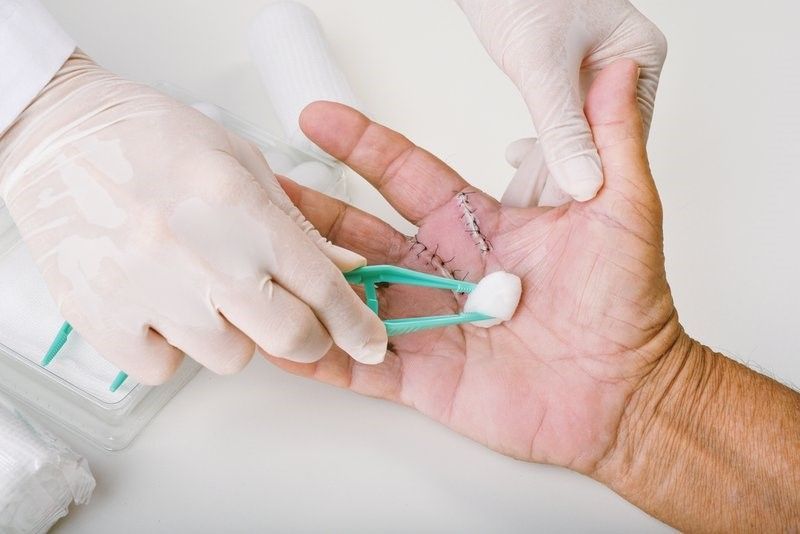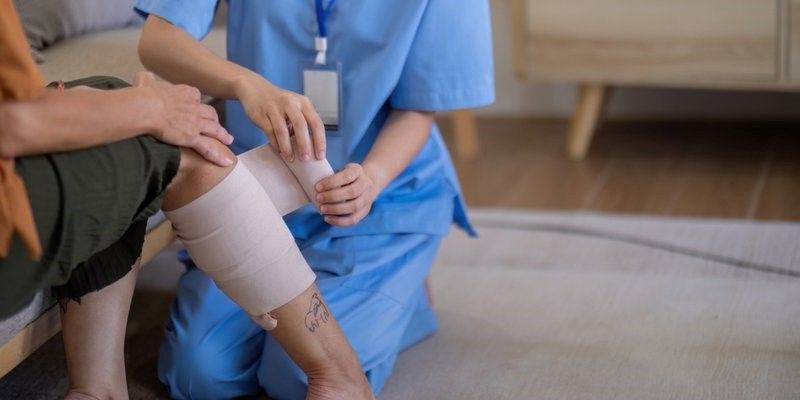A family owned business providing a full range of home health and school nursing services
Mastering Wound Care at Home
Wound healing can be significantly impacted by factors such as age and chronic diseases. As individuals age, their skin becomes thinner and less elastic, making it more susceptible to injuries and slower to heal. Chronic conditions, particularly diabetes, can further complicate wound healing by impairing blood circulation and immune response. Understanding and implementing effective wound care techniques is crucial for managing injuries at home, preventing infections, and promoting faster recovery.
The Importance of Effective Wound Care
Proper wound care is essential for preventing infections and promoting faster recovery. When wounds are not adequately cleaned and dressed, they become breeding grounds for bacteria, leading to infections that can complicate healing and require more intensive medical interventions. Effective wound care minimizes the risk of such complications, ensuring that the wound environment remains conducive to healing.
Proper wound care prevents infections and accelerates the healing process. By maintaining a clean and moist wound environment, the body can more efficiently repair damaged tissues. This reduces the healing time and minimizes the risk of scarring and other long-term complications.
Furthermore, effective wound care can significantly reduce pain and discomfort associated with injuries. Properly dressed wounds are less likely to become irritated or inflamed, which can alleviate pain and improve overall comfort. This is particularly important for individuals with
chronic conditions or those recovering from surgery, as it can enhance their quality of life during the healing process.

Essential Wound Care Techniques for Home Management
Effective home wound care begins with proper cleaning. Start by washing your hands thoroughly to prevent introducing bacteria to the wound. Next, a professional would review the physician-ordered wound care and provide instructions. If uncomfortable, have a professional come to your home.
Monitoring the wound is an ongoing process. Check for signs of infection, such as increased redness, swelling, warmth, or pus. If any of these symptoms appear, consult a healthcare professional immediately. Additionally, keep an eye on the wound's progress. If it does not show signs of healing within a few days, or if it worsens, seek medical advice.
Incorporating these basic techniques into your wound care routine can significantly improve healing outcomes. By maintaining cleanliness, using appropriate dressings, and monitoring the wound, you can effectively manage minor injuries at home and reduce the risk of complications.
Tips for Preventing Wounds and Promoting Healing
Preventing wounds and promoting healing involves a combination of good hygiene, proper nutrition, and proactive care. Maintaining clean skin is the first step in wound prevention. Regularly wash your hands and body with mild soap and water to remove dirt and bacteria. Pay special attention to areas prone to friction or pressure, as these are more susceptible to injuries.
Nutrition plays a vital role in wound healing. A balanced diet rich in vitamins and minerals supports the body's natural repair processes. Key nutrients include:
- Protein: Essential for tissue repair and regeneration.
- Vitamin C: Promotes collagen production and strengthens the immune system.
- Zinc: Aids in cell growth and wound healing.
- Vitamin A: Supports skin health and immune function.
Incorporate a variety of fruits, vegetables, lean proteins, and whole grains into your diet to ensure you receive these essential nutrients.
Proper wound care techniques also contribute to faster healing. Keep wounds clean and covered to protect them from infection. Change dressings regularly and monitor the wound for any signs of complications. Avoid picking at scabs or removing dressings prematurely, as this can disrupt the healing process.
Lastly, stay hydrated and maintain a healthy lifestyle. Adequate hydration supports overall skin health and elasticity, reducing the risk of injuries. Regular exercise improves circulation, which is crucial for delivering nutrients and oxygen to healing tissues. By following these practical tips, you can effectively prevent wounds and promote faster, more efficient healing.
Benefits of Hiring Professional Home Health Services
Hiring professional home health services offers numerous advantages, particularly for those with complex or chronic wounds. Home health agencies work with RNs and LPNs who bring specialized knowledge and experience to wound care, ensuring that each wound receives the appropriate treatment. This expertise can significantly reduce the risk of complications and promote faster healing.
In addition to their expertise, home health professionals provide personalized care tailored to the individual's specific needs. They can assess the wound, recommend the best treatment options, and adjust care plans as necessary. This level of customization is often difficult to achieve with standard, one-size-fits-all approaches.

Another key benefit is the convenience and comfort of receiving care at home. For individuals with mobility issues or those recovering from surgery, traveling to a medical facility can be challenging. Home health services eliminate this need, allowing patients to receive high-quality care in the comfort of their own homes. This not only reduces stress but also supports a more conducive healing environment.
Furthermore, professional home health services offer continuous monitoring and timely interventions. Regular visits from healthcare professionals ensure that any changes in the wound's condition are promptly addressed. This proactive approach can prevent minor issues from escalating into serious complications, ultimately improving health outcomes.
Mastering Wound Care at Home with Healthcare Professionals
Mastering wound care at home involves implementing effective techniques and recognizing the benefits of professional home health services. Proper wound care is critical for preventing infections and promoting faster recovery. Essential techniques such as cleaning, dressing, and monitoring wounds are fundamental for home management. Hiring healthcare professionals ensures proper treatment and timely interventions, while patient education and access to resources empower individuals to manage their care effectively.
For those needing additional support, professional providers from home health agencies offer personalized care and expertise, ensuring optimal wound care outcomes. Contact CritiCare for comprehensive wound care assistance.

CONTACT INFORMATION
Chadds Ford PA 19317
info@criticareplus.com
Mon-Fri 9:00 AM - 5:00 PM, Sat-Sun - Closed
24 Hours on call services
OUR LOCATION
BROWSE
CONTACT INFORMATION
Chadds Ford PA 19317
info@criticareplus.com
Mon-Fri 9:00 AM - 5:00 PM, Sat-Sun - Closed
24 Hours on call services
OUR LOCATION










